Comprehensive Report on UK Business Law: System, Impact & Resolution
VerifiedAdded on 2023/01/13
|11
|4199
|74
Report
AI Summary
This report provides a detailed analysis of the UK business law, focusing on the evaluation of the legal system, sources of law, and the government's role in law-making. It explores the impact of company, contract, and employment law on business organizations, differentiating between legislation, regulation, and standards. The report also examines the funding, management, and formation of different types of organizations and evaluates the concept of dispute resolution systems through examples. It covers common law, legislation, legal encyclopedias, law commissions, and law journals as sources, further explaining the parliamentary process of law formation in the UK.
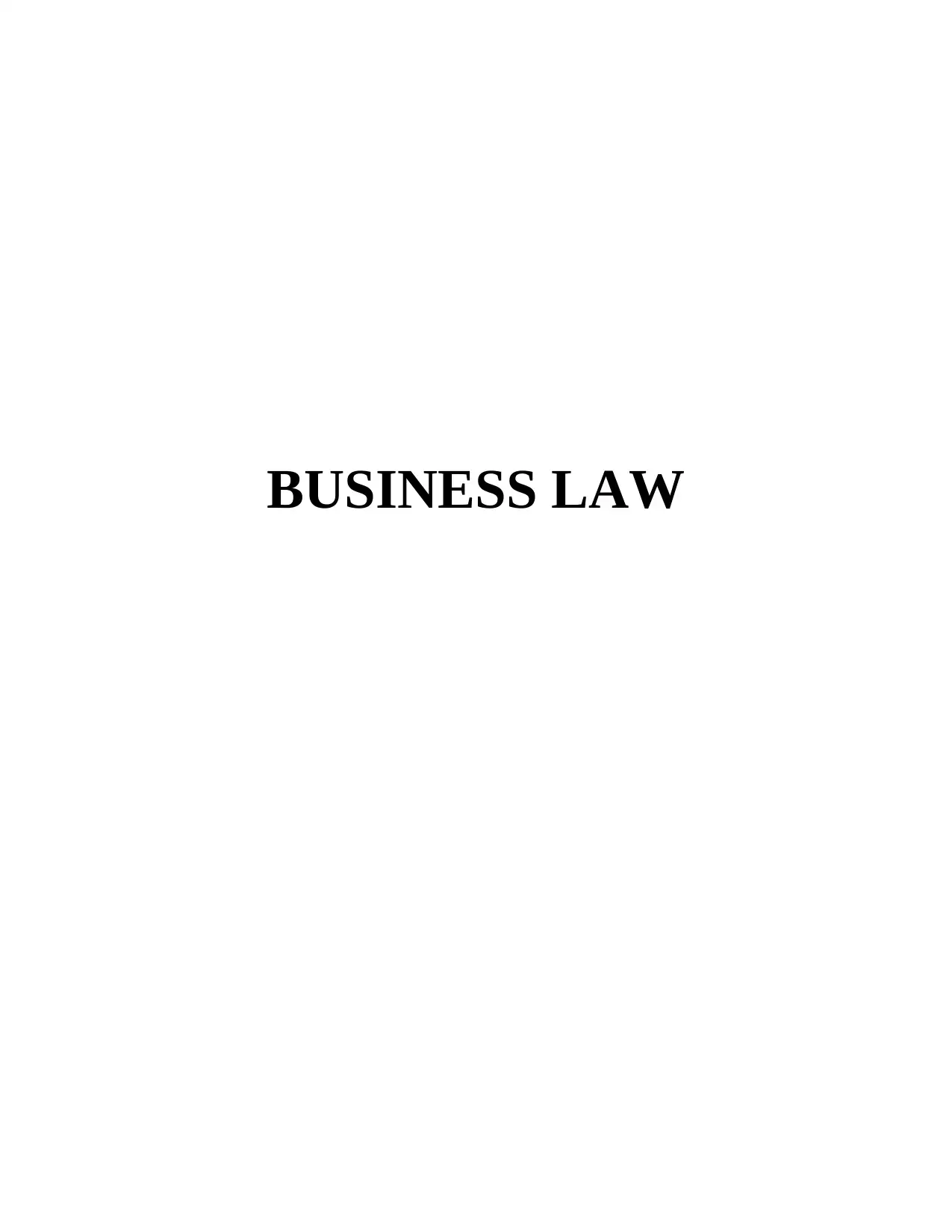
BUSINESS LAW
Paraphrase This Document
Need a fresh take? Get an instant paraphrase of this document with our AI Paraphraser
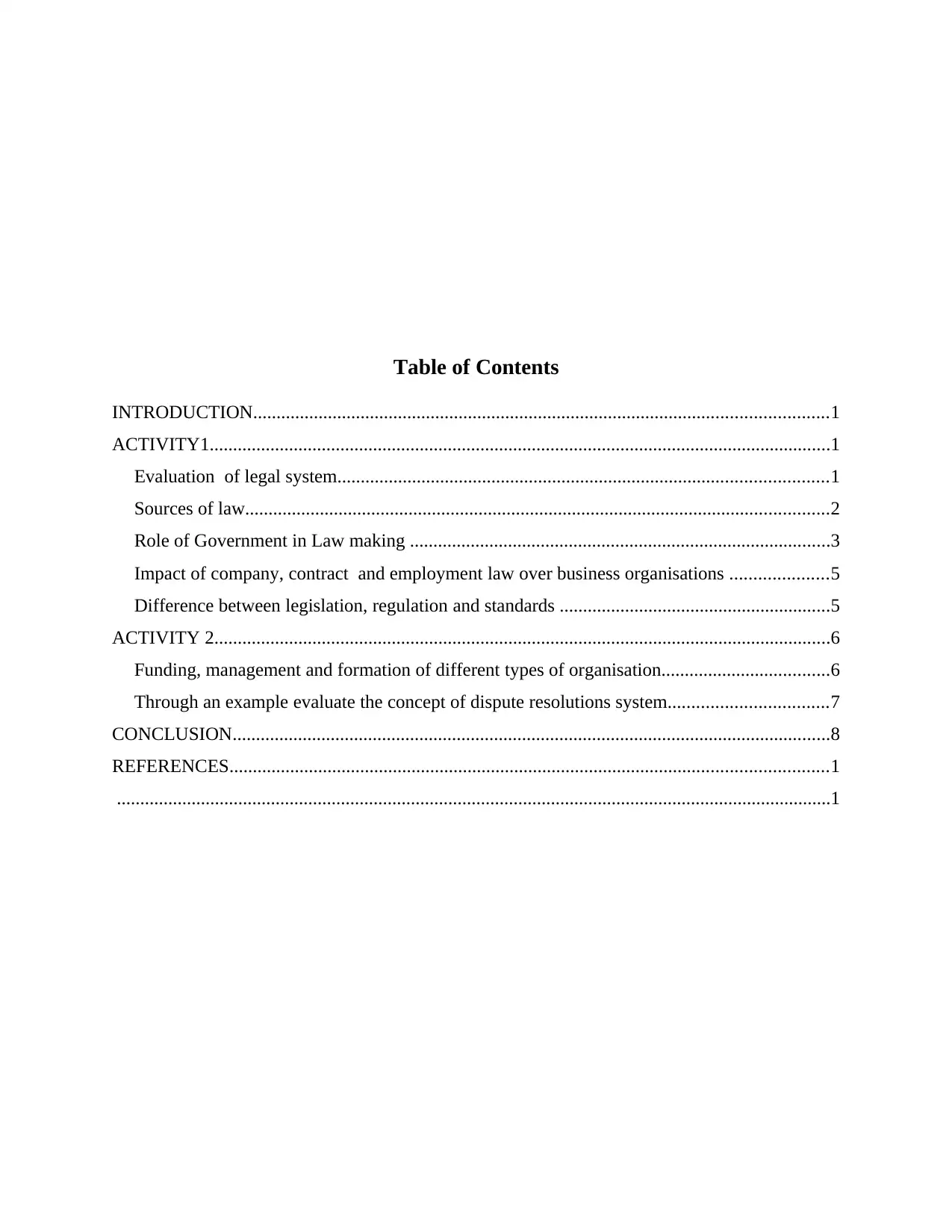
Table of Contents
INTRODUCTION...........................................................................................................................1
ACTIVITY1.....................................................................................................................................1
Evaluation of legal system.........................................................................................................1
Sources of law.............................................................................................................................2
Role of Government in Law making ..........................................................................................3
Impact of company, contract and employment law over business organisations .....................5
Difference between legislation, regulation and standards ..........................................................5
ACTIVITY 2....................................................................................................................................6
Funding, management and formation of different types of organisation....................................6
Through an example evaluate the concept of dispute resolutions system..................................7
CONCLUSION................................................................................................................................8
REFERENCES................................................................................................................................1
.........................................................................................................................................................1
INTRODUCTION...........................................................................................................................1
ACTIVITY1.....................................................................................................................................1
Evaluation of legal system.........................................................................................................1
Sources of law.............................................................................................................................2
Role of Government in Law making ..........................................................................................3
Impact of company, contract and employment law over business organisations .....................5
Difference between legislation, regulation and standards ..........................................................5
ACTIVITY 2....................................................................................................................................6
Funding, management and formation of different types of organisation....................................6
Through an example evaluate the concept of dispute resolutions system..................................7
CONCLUSION................................................................................................................................8
REFERENCES................................................................................................................................1
.........................................................................................................................................................1
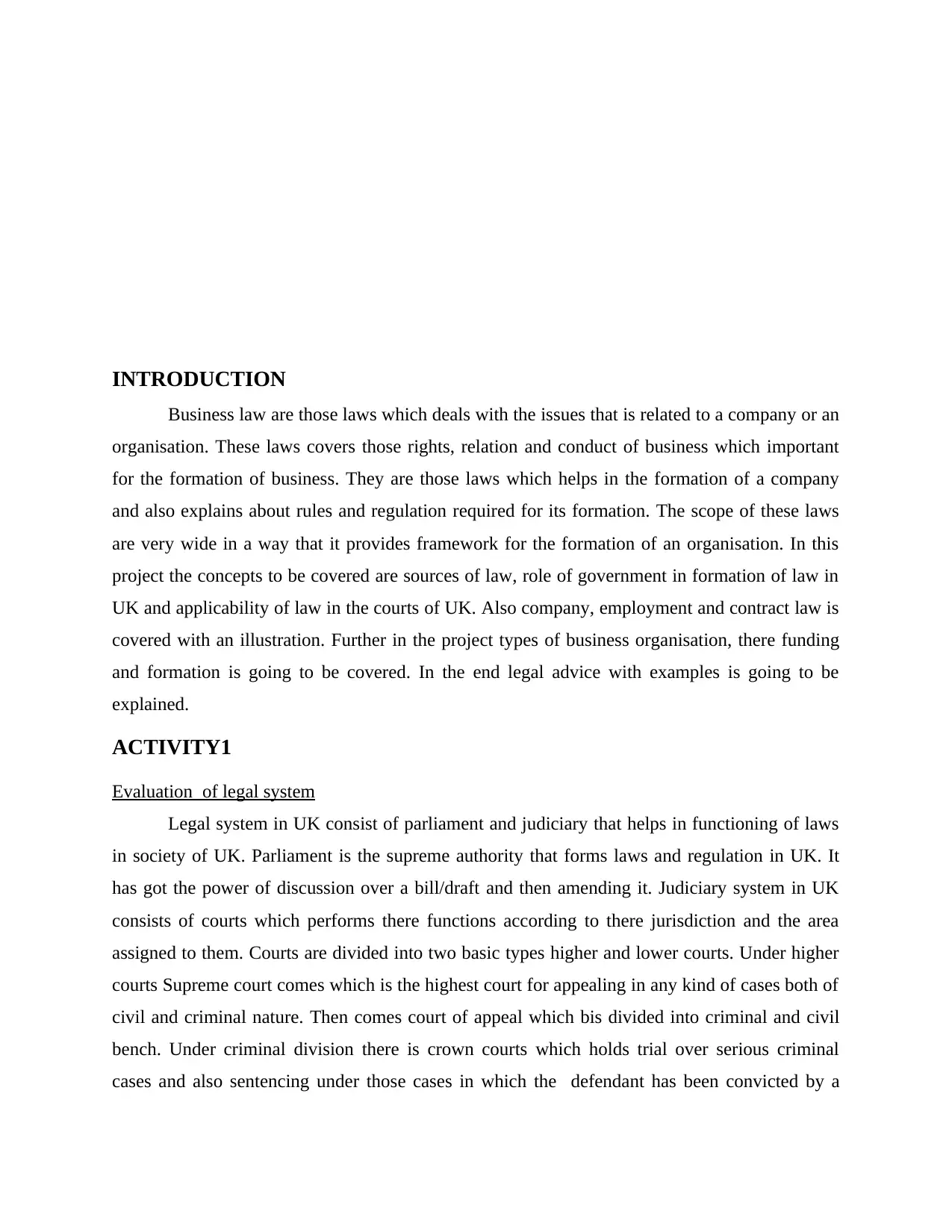
INTRODUCTION
Business law are those laws which deals with the issues that is related to a company or an
organisation. These laws covers those rights, relation and conduct of business which important
for the formation of business. They are those laws which helps in the formation of a company
and also explains about rules and regulation required for its formation. The scope of these laws
are very wide in a way that it provides framework for the formation of an organisation. In this
project the concepts to be covered are sources of law, role of government in formation of law in
UK and applicability of law in the courts of UK. Also company, employment and contract law is
covered with an illustration. Further in the project types of business organisation, there funding
and formation is going to be covered. In the end legal advice with examples is going to be
explained.
ACTIVITY1
Evaluation of legal system
Legal system in UK consist of parliament and judiciary that helps in functioning of laws
in society of UK. Parliament is the supreme authority that forms laws and regulation in UK. It
has got the power of discussion over a bill/draft and then amending it. Judiciary system in UK
consists of courts which performs there functions according to there jurisdiction and the area
assigned to them. Courts are divided into two basic types higher and lower courts. Under higher
courts Supreme court comes which is the highest court for appealing in any kind of cases both of
civil and criminal nature. Then comes court of appeal which bis divided into criminal and civil
bench. Under criminal division there is crown courts which holds trial over serious criminal
cases and also sentencing under those cases in which the defendant has been convicted by a
Business law are those laws which deals with the issues that is related to a company or an
organisation. These laws covers those rights, relation and conduct of business which important
for the formation of business. They are those laws which helps in the formation of a company
and also explains about rules and regulation required for its formation. The scope of these laws
are very wide in a way that it provides framework for the formation of an organisation. In this
project the concepts to be covered are sources of law, role of government in formation of law in
UK and applicability of law in the courts of UK. Also company, employment and contract law is
covered with an illustration. Further in the project types of business organisation, there funding
and formation is going to be covered. In the end legal advice with examples is going to be
explained.
ACTIVITY1
Evaluation of legal system
Legal system in UK consist of parliament and judiciary that helps in functioning of laws
in society of UK. Parliament is the supreme authority that forms laws and regulation in UK. It
has got the power of discussion over a bill/draft and then amending it. Judiciary system in UK
consists of courts which performs there functions according to there jurisdiction and the area
assigned to them. Courts are divided into two basic types higher and lower courts. Under higher
courts Supreme court comes which is the highest court for appealing in any kind of cases both of
civil and criminal nature. Then comes court of appeal which bis divided into criminal and civil
bench. Under criminal division there is crown courts which holds trial over serious criminal
cases and also sentencing under those cases in which the defendant has been convicted by a
⊘ This is a preview!⊘
Do you want full access?
Subscribe today to unlock all pages.

Trusted by 1+ million students worldwide
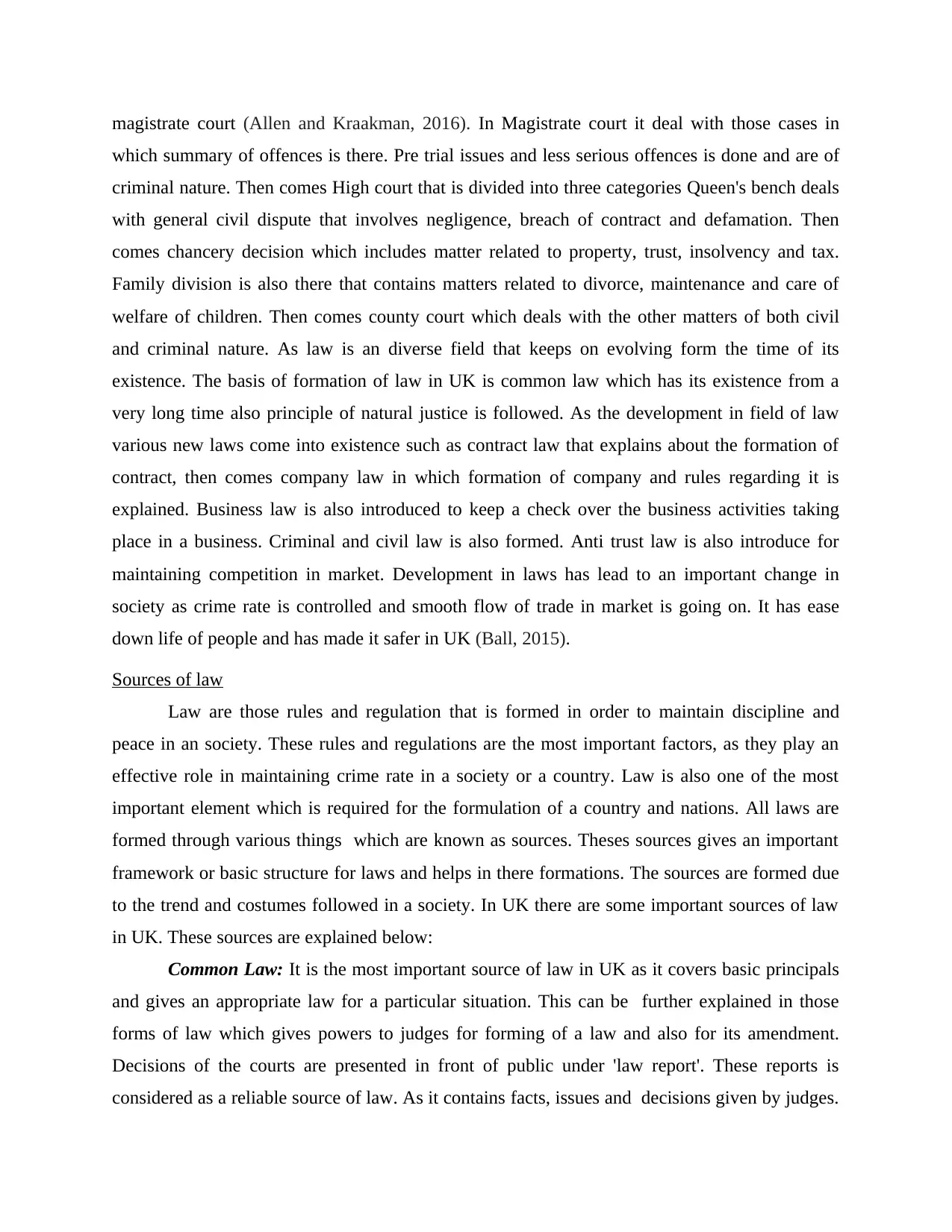
magistrate court (Allen and Kraakman, 2016). In Magistrate court it deal with those cases in
which summary of offences is there. Pre trial issues and less serious offences is done and are of
criminal nature. Then comes High court that is divided into three categories Queen's bench deals
with general civil dispute that involves negligence, breach of contract and defamation. Then
comes chancery decision which includes matter related to property, trust, insolvency and tax.
Family division is also there that contains matters related to divorce, maintenance and care of
welfare of children. Then comes county court which deals with the other matters of both civil
and criminal nature. As law is an diverse field that keeps on evolving form the time of its
existence. The basis of formation of law in UK is common law which has its existence from a
very long time also principle of natural justice is followed. As the development in field of law
various new laws come into existence such as contract law that explains about the formation of
contract, then comes company law in which formation of company and rules regarding it is
explained. Business law is also introduced to keep a check over the business activities taking
place in a business. Criminal and civil law is also formed. Anti trust law is also introduce for
maintaining competition in market. Development in laws has lead to an important change in
society as crime rate is controlled and smooth flow of trade in market is going on. It has ease
down life of people and has made it safer in UK (Ball, 2015).
Sources of law
Law are those rules and regulation that is formed in order to maintain discipline and
peace in an society. These rules and regulations are the most important factors, as they play an
effective role in maintaining crime rate in a society or a country. Law is also one of the most
important element which is required for the formulation of a country and nations. All laws are
formed through various things which are known as sources. Theses sources gives an important
framework or basic structure for laws and helps in there formations. The sources are formed due
to the trend and costumes followed in a society. In UK there are some important sources of law
in UK. These sources are explained below:
Common Law: It is the most important source of law in UK as it covers basic principals
and gives an appropriate law for a particular situation. This can be further explained in those
forms of law which gives powers to judges for forming of a law and also for its amendment.
Decisions of the courts are presented in front of public under 'law report'. These reports is
considered as a reliable source of law. As it contains facts, issues and decisions given by judges.
which summary of offences is there. Pre trial issues and less serious offences is done and are of
criminal nature. Then comes High court that is divided into three categories Queen's bench deals
with general civil dispute that involves negligence, breach of contract and defamation. Then
comes chancery decision which includes matter related to property, trust, insolvency and tax.
Family division is also there that contains matters related to divorce, maintenance and care of
welfare of children. Then comes county court which deals with the other matters of both civil
and criminal nature. As law is an diverse field that keeps on evolving form the time of its
existence. The basis of formation of law in UK is common law which has its existence from a
very long time also principle of natural justice is followed. As the development in field of law
various new laws come into existence such as contract law that explains about the formation of
contract, then comes company law in which formation of company and rules regarding it is
explained. Business law is also introduced to keep a check over the business activities taking
place in a business. Criminal and civil law is also formed. Anti trust law is also introduce for
maintaining competition in market. Development in laws has lead to an important change in
society as crime rate is controlled and smooth flow of trade in market is going on. It has ease
down life of people and has made it safer in UK (Ball, 2015).
Sources of law
Law are those rules and regulation that is formed in order to maintain discipline and
peace in an society. These rules and regulations are the most important factors, as they play an
effective role in maintaining crime rate in a society or a country. Law is also one of the most
important element which is required for the formulation of a country and nations. All laws are
formed through various things which are known as sources. Theses sources gives an important
framework or basic structure for laws and helps in there formations. The sources are formed due
to the trend and costumes followed in a society. In UK there are some important sources of law
in UK. These sources are explained below:
Common Law: It is the most important source of law in UK as it covers basic principals
and gives an appropriate law for a particular situation. This can be further explained in those
forms of law which gives powers to judges for forming of a law and also for its amendment.
Decisions of the courts are presented in front of public under 'law report'. These reports is
considered as a reliable source of law. As it contains facts, issues and decisions given by judges.
Paraphrase This Document
Need a fresh take? Get an instant paraphrase of this document with our AI Paraphraser
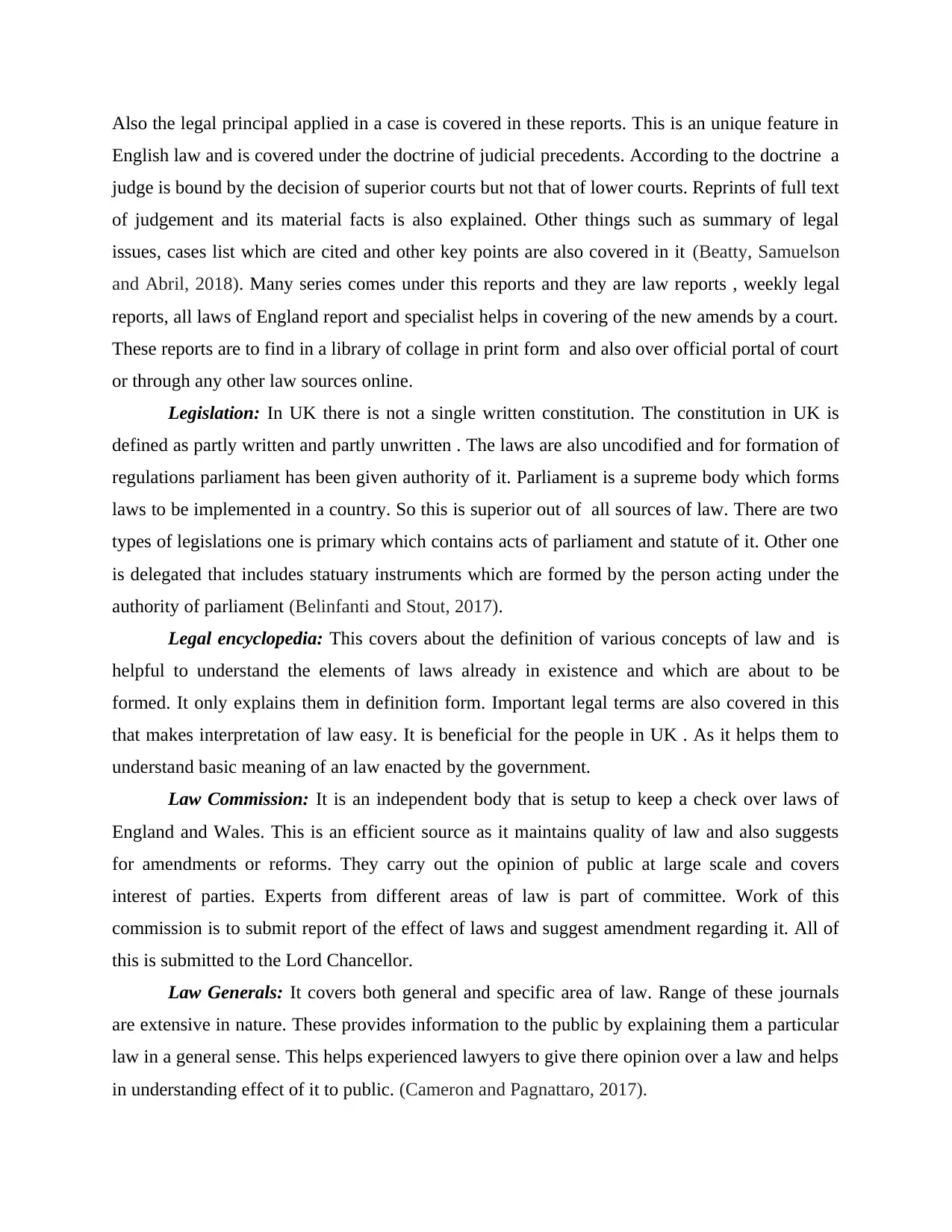
Also the legal principal applied in a case is covered in these reports. This is an unique feature in
English law and is covered under the doctrine of judicial precedents. According to the doctrine a
judge is bound by the decision of superior courts but not that of lower courts. Reprints of full text
of judgement and its material facts is also explained. Other things such as summary of legal
issues, cases list which are cited and other key points are also covered in it (Beatty, Samuelson
and Abril, 2018). Many series comes under this reports and they are law reports , weekly legal
reports, all laws of England report and specialist helps in covering of the new amends by a court.
These reports are to find in a library of collage in print form and also over official portal of court
or through any other law sources online.
Legislation: In UK there is not a single written constitution. The constitution in UK is
defined as partly written and partly unwritten . The laws are also uncodified and for formation of
regulations parliament has been given authority of it. Parliament is a supreme body which forms
laws to be implemented in a country. So this is superior out of all sources of law. There are two
types of legislations one is primary which contains acts of parliament and statute of it. Other one
is delegated that includes statuary instruments which are formed by the person acting under the
authority of parliament (Belinfanti and Stout, 2017).
Legal encyclopedia: This covers about the definition of various concepts of law and is
helpful to understand the elements of laws already in existence and which are about to be
formed. It only explains them in definition form. Important legal terms are also covered in this
that makes interpretation of law easy. It is beneficial for the people in UK . As it helps them to
understand basic meaning of an law enacted by the government.
Law Commission: It is an independent body that is setup to keep a check over laws of
England and Wales. This is an efficient source as it maintains quality of law and also suggests
for amendments or reforms. They carry out the opinion of public at large scale and covers
interest of parties. Experts from different areas of law is part of committee. Work of this
commission is to submit report of the effect of laws and suggest amendment regarding it. All of
this is submitted to the Lord Chancellor.
Law Generals: It covers both general and specific area of law. Range of these journals
are extensive in nature. These provides information to the public by explaining them a particular
law in a general sense. This helps experienced lawyers to give there opinion over a law and helps
in understanding effect of it to public. (Cameron and Pagnattaro, 2017).
English law and is covered under the doctrine of judicial precedents. According to the doctrine a
judge is bound by the decision of superior courts but not that of lower courts. Reprints of full text
of judgement and its material facts is also explained. Other things such as summary of legal
issues, cases list which are cited and other key points are also covered in it (Beatty, Samuelson
and Abril, 2018). Many series comes under this reports and they are law reports , weekly legal
reports, all laws of England report and specialist helps in covering of the new amends by a court.
These reports are to find in a library of collage in print form and also over official portal of court
or through any other law sources online.
Legislation: In UK there is not a single written constitution. The constitution in UK is
defined as partly written and partly unwritten . The laws are also uncodified and for formation of
regulations parliament has been given authority of it. Parliament is a supreme body which forms
laws to be implemented in a country. So this is superior out of all sources of law. There are two
types of legislations one is primary which contains acts of parliament and statute of it. Other one
is delegated that includes statuary instruments which are formed by the person acting under the
authority of parliament (Belinfanti and Stout, 2017).
Legal encyclopedia: This covers about the definition of various concepts of law and is
helpful to understand the elements of laws already in existence and which are about to be
formed. It only explains them in definition form. Important legal terms are also covered in this
that makes interpretation of law easy. It is beneficial for the people in UK . As it helps them to
understand basic meaning of an law enacted by the government.
Law Commission: It is an independent body that is setup to keep a check over laws of
England and Wales. This is an efficient source as it maintains quality of law and also suggests
for amendments or reforms. They carry out the opinion of public at large scale and covers
interest of parties. Experts from different areas of law is part of committee. Work of this
commission is to submit report of the effect of laws and suggest amendment regarding it. All of
this is submitted to the Lord Chancellor.
Law Generals: It covers both general and specific area of law. Range of these journals
are extensive in nature. These provides information to the public by explaining them a particular
law in a general sense. This helps experienced lawyers to give there opinion over a law and helps
in understanding effect of it to public. (Cameron and Pagnattaro, 2017).
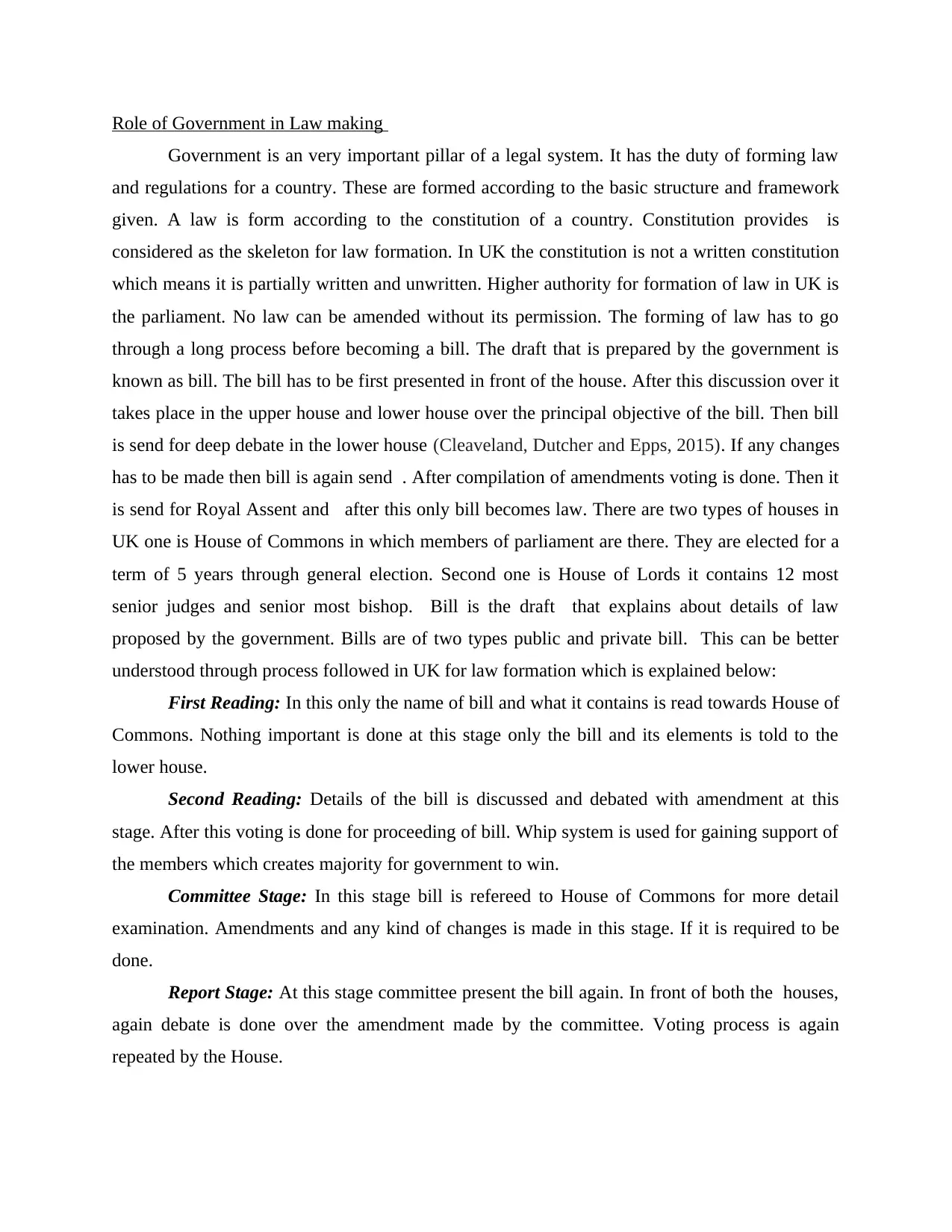
Role of Government in Law making
Government is an very important pillar of a legal system. It has the duty of forming law
and regulations for a country. These are formed according to the basic structure and framework
given. A law is form according to the constitution of a country. Constitution provides is
considered as the skeleton for law formation. In UK the constitution is not a written constitution
which means it is partially written and unwritten. Higher authority for formation of law in UK is
the parliament. No law can be amended without its permission. The forming of law has to go
through a long process before becoming a bill. The draft that is prepared by the government is
known as bill. The bill has to be first presented in front of the house. After this discussion over it
takes place in the upper house and lower house over the principal objective of the bill. Then bill
is send for deep debate in the lower house (Cleaveland, Dutcher and Epps, 2015). If any changes
has to be made then bill is again send . After compilation of amendments voting is done. Then it
is send for Royal Assent and after this only bill becomes law. There are two types of houses in
UK one is House of Commons in which members of parliament are there. They are elected for a
term of 5 years through general election. Second one is House of Lords it contains 12 most
senior judges and senior most bishop. Bill is the draft that explains about details of law
proposed by the government. Bills are of two types public and private bill. This can be better
understood through process followed in UK for law formation which is explained below:
First Reading: In this only the name of bill and what it contains is read towards House of
Commons. Nothing important is done at this stage only the bill and its elements is told to the
lower house.
Second Reading: Details of the bill is discussed and debated with amendment at this
stage. After this voting is done for proceeding of bill. Whip system is used for gaining support of
the members which creates majority for government to win.
Committee Stage: In this stage bill is refereed to House of Commons for more detail
examination. Amendments and any kind of changes is made in this stage. If it is required to be
done.
Report Stage: At this stage committee present the bill again. In front of both the houses,
again debate is done over the amendment made by the committee. Voting process is again
repeated by the House.
Government is an very important pillar of a legal system. It has the duty of forming law
and regulations for a country. These are formed according to the basic structure and framework
given. A law is form according to the constitution of a country. Constitution provides is
considered as the skeleton for law formation. In UK the constitution is not a written constitution
which means it is partially written and unwritten. Higher authority for formation of law in UK is
the parliament. No law can be amended without its permission. The forming of law has to go
through a long process before becoming a bill. The draft that is prepared by the government is
known as bill. The bill has to be first presented in front of the house. After this discussion over it
takes place in the upper house and lower house over the principal objective of the bill. Then bill
is send for deep debate in the lower house (Cleaveland, Dutcher and Epps, 2015). If any changes
has to be made then bill is again send . After compilation of amendments voting is done. Then it
is send for Royal Assent and after this only bill becomes law. There are two types of houses in
UK one is House of Commons in which members of parliament are there. They are elected for a
term of 5 years through general election. Second one is House of Lords it contains 12 most
senior judges and senior most bishop. Bill is the draft that explains about details of law
proposed by the government. Bills are of two types public and private bill. This can be better
understood through process followed in UK for law formation which is explained below:
First Reading: In this only the name of bill and what it contains is read towards House of
Commons. Nothing important is done at this stage only the bill and its elements is told to the
lower house.
Second Reading: Details of the bill is discussed and debated with amendment at this
stage. After this voting is done for proceeding of bill. Whip system is used for gaining support of
the members which creates majority for government to win.
Committee Stage: In this stage bill is refereed to House of Commons for more detail
examination. Amendments and any kind of changes is made in this stage. If it is required to be
done.
Report Stage: At this stage committee present the bill again. In front of both the houses,
again debate is done over the amendment made by the committee. Voting process is again
repeated by the House.
⊘ This is a preview!⊘
Do you want full access?
Subscribe today to unlock all pages.

Trusted by 1+ million students worldwide
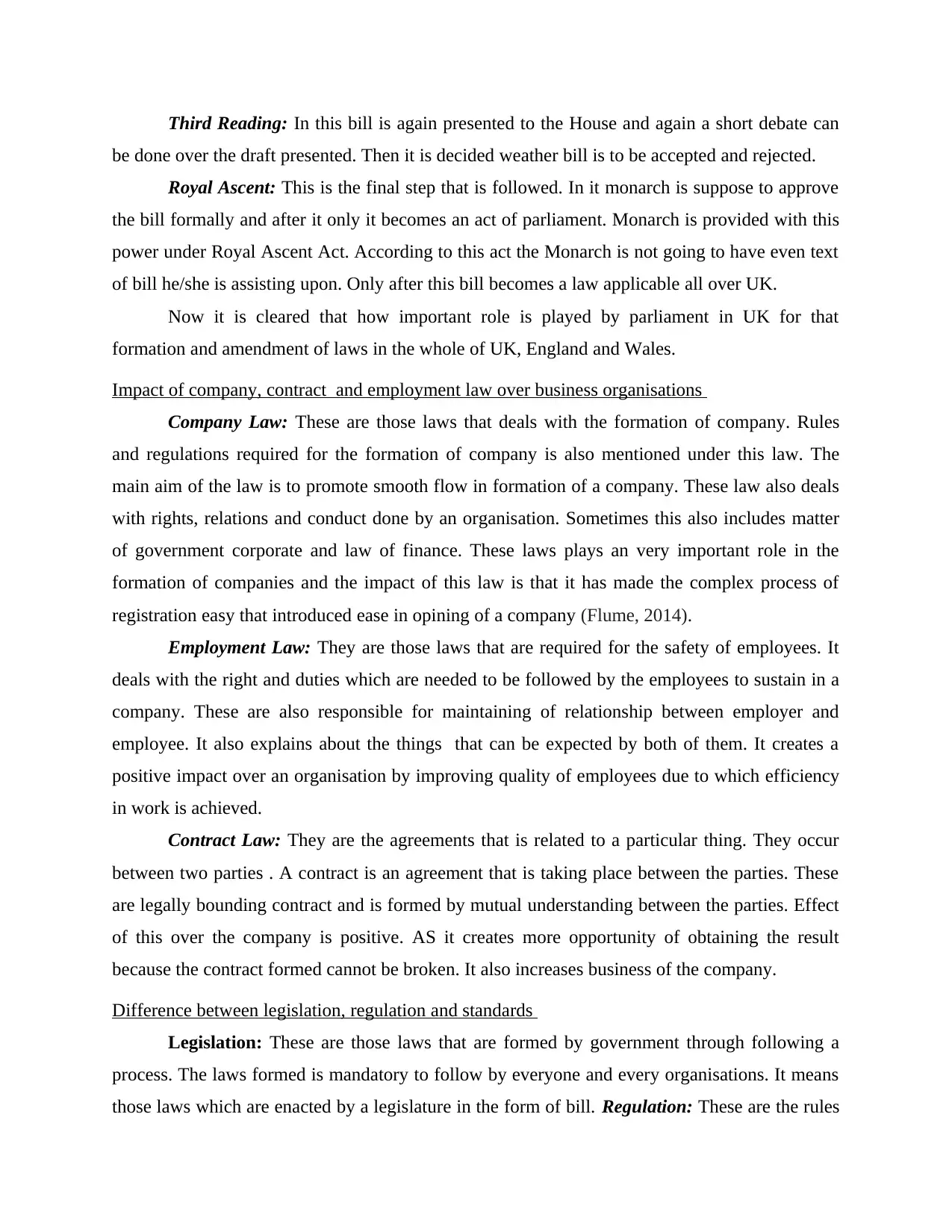
Third Reading: In this bill is again presented to the House and again a short debate can
be done over the draft presented. Then it is decided weather bill is to be accepted and rejected.
Royal Ascent: This is the final step that is followed. In it monarch is suppose to approve
the bill formally and after it only it becomes an act of parliament. Monarch is provided with this
power under Royal Ascent Act. According to this act the Monarch is not going to have even text
of bill he/she is assisting upon. Only after this bill becomes a law applicable all over UK.
Now it is cleared that how important role is played by parliament in UK for that
formation and amendment of laws in the whole of UK, England and Wales.
Impact of company, contract and employment law over business organisations
Company Law: These are those laws that deals with the formation of company. Rules
and regulations required for the formation of company is also mentioned under this law. The
main aim of the law is to promote smooth flow in formation of a company. These law also deals
with rights, relations and conduct done by an organisation. Sometimes this also includes matter
of government corporate and law of finance. These laws plays an very important role in the
formation of companies and the impact of this law is that it has made the complex process of
registration easy that introduced ease in opining of a company (Flume, 2014).
Employment Law: They are those laws that are required for the safety of employees. It
deals with the right and duties which are needed to be followed by the employees to sustain in a
company. These are also responsible for maintaining of relationship between employer and
employee. It also explains about the things that can be expected by both of them. It creates a
positive impact over an organisation by improving quality of employees due to which efficiency
in work is achieved.
Contract Law: They are the agreements that is related to a particular thing. They occur
between two parties . A contract is an agreement that is taking place between the parties. These
are legally bounding contract and is formed by mutual understanding between the parties. Effect
of this over the company is positive. AS it creates more opportunity of obtaining the result
because the contract formed cannot be broken. It also increases business of the company.
Difference between legislation, regulation and standards
Legislation: These are those laws that are formed by government through following a
process. The laws formed is mandatory to follow by everyone and every organisations. It means
those laws which are enacted by a legislature in the form of bill. Regulation: These are the rules
be done over the draft presented. Then it is decided weather bill is to be accepted and rejected.
Royal Ascent: This is the final step that is followed. In it monarch is suppose to approve
the bill formally and after it only it becomes an act of parliament. Monarch is provided with this
power under Royal Ascent Act. According to this act the Monarch is not going to have even text
of bill he/she is assisting upon. Only after this bill becomes a law applicable all over UK.
Now it is cleared that how important role is played by parliament in UK for that
formation and amendment of laws in the whole of UK, England and Wales.
Impact of company, contract and employment law over business organisations
Company Law: These are those laws that deals with the formation of company. Rules
and regulations required for the formation of company is also mentioned under this law. The
main aim of the law is to promote smooth flow in formation of a company. These law also deals
with rights, relations and conduct done by an organisation. Sometimes this also includes matter
of government corporate and law of finance. These laws plays an very important role in the
formation of companies and the impact of this law is that it has made the complex process of
registration easy that introduced ease in opining of a company (Flume, 2014).
Employment Law: They are those laws that are required for the safety of employees. It
deals with the right and duties which are needed to be followed by the employees to sustain in a
company. These are also responsible for maintaining of relationship between employer and
employee. It also explains about the things that can be expected by both of them. It creates a
positive impact over an organisation by improving quality of employees due to which efficiency
in work is achieved.
Contract Law: They are the agreements that is related to a particular thing. They occur
between two parties . A contract is an agreement that is taking place between the parties. These
are legally bounding contract and is formed by mutual understanding between the parties. Effect
of this over the company is positive. AS it creates more opportunity of obtaining the result
because the contract formed cannot be broken. It also increases business of the company.
Difference between legislation, regulation and standards
Legislation: These are those laws that are formed by government through following a
process. The laws formed is mandatory to follow by everyone and every organisations. It means
those laws which are enacted by a legislature in the form of bill. Regulation: These are the rules
Paraphrase This Document
Need a fresh take? Get an instant paraphrase of this document with our AI Paraphraser
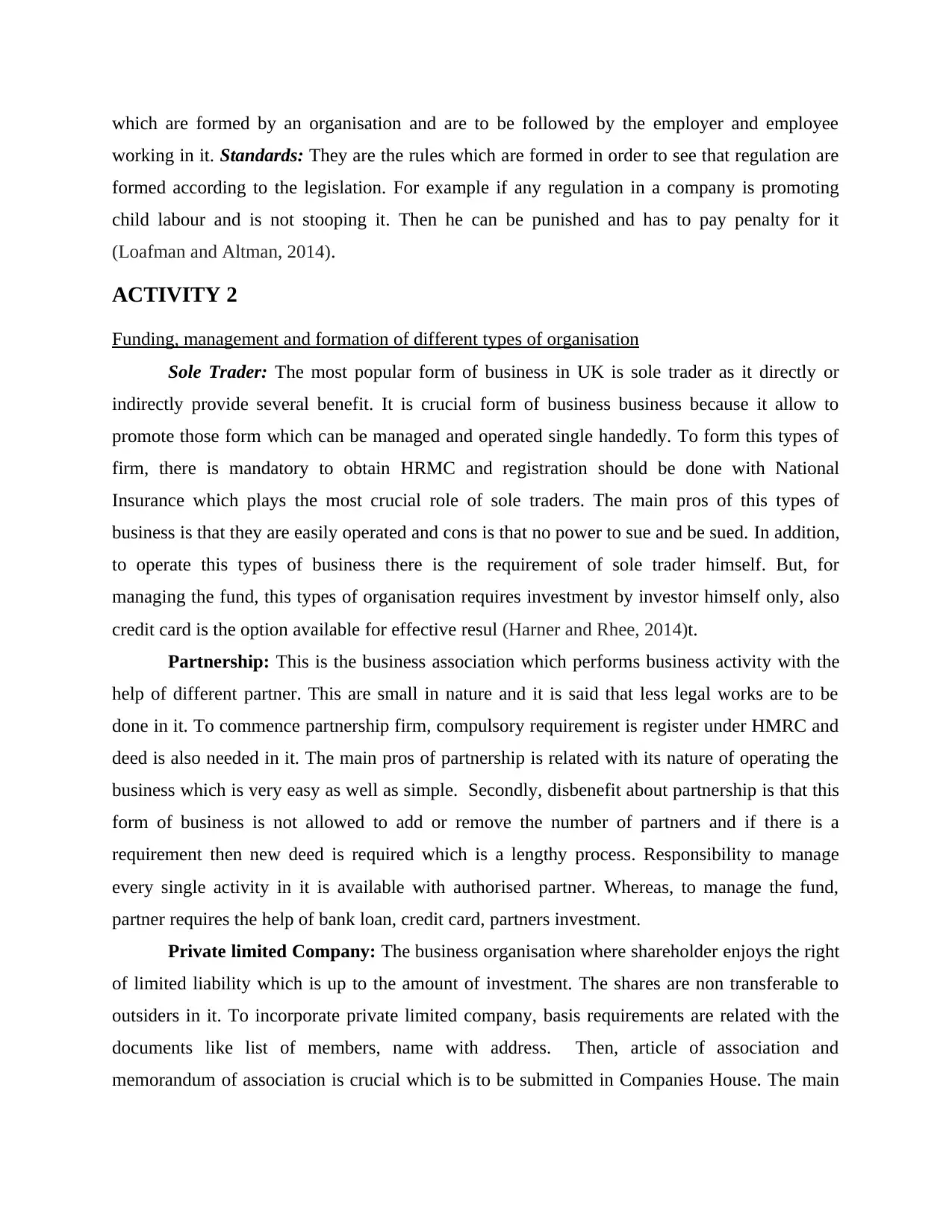
which are formed by an organisation and are to be followed by the employer and employee
working in it. Standards: They are the rules which are formed in order to see that regulation are
formed according to the legislation. For example if any regulation in a company is promoting
child labour and is not stooping it. Then he can be punished and has to pay penalty for it
(Loafman and Altman, 2014).
ACTIVITY 2
Funding, management and formation of different types of organisation
Sole Trader: The most popular form of business in UK is sole trader as it directly or
indirectly provide several benefit. It is crucial form of business business because it allow to
promote those form which can be managed and operated single handedly. To form this types of
firm, there is mandatory to obtain HRMC and registration should be done with National
Insurance which plays the most crucial role of sole traders. The main pros of this types of
business is that they are easily operated and cons is that no power to sue and be sued. In addition,
to operate this types of business there is the requirement of sole trader himself. But, for
managing the fund, this types of organisation requires investment by investor himself only, also
credit card is the option available for effective resul (Harner and Rhee, 2014)t.
Partnership: This is the business association which performs business activity with the
help of different partner. This are small in nature and it is said that less legal works are to be
done in it. To commence partnership firm, compulsory requirement is register under HMRC and
deed is also needed in it. The main pros of partnership is related with its nature of operating the
business which is very easy as well as simple. Secondly, disbenefit about partnership is that this
form of business is not allowed to add or remove the number of partners and if there is a
requirement then new deed is required which is a lengthy process. Responsibility to manage
every single activity in it is available with authorised partner. Whereas, to manage the fund,
partner requires the help of bank loan, credit card, partners investment.
Private limited Company: The business organisation where shareholder enjoys the right
of limited liability which is up to the amount of investment. The shares are non transferable to
outsiders in it. To incorporate private limited company, basis requirements are related with the
documents like list of members, name with address. Then, article of association and
memorandum of association is crucial which is to be submitted in Companies House. The main
working in it. Standards: They are the rules which are formed in order to see that regulation are
formed according to the legislation. For example if any regulation in a company is promoting
child labour and is not stooping it. Then he can be punished and has to pay penalty for it
(Loafman and Altman, 2014).
ACTIVITY 2
Funding, management and formation of different types of organisation
Sole Trader: The most popular form of business in UK is sole trader as it directly or
indirectly provide several benefit. It is crucial form of business business because it allow to
promote those form which can be managed and operated single handedly. To form this types of
firm, there is mandatory to obtain HRMC and registration should be done with National
Insurance which plays the most crucial role of sole traders. The main pros of this types of
business is that they are easily operated and cons is that no power to sue and be sued. In addition,
to operate this types of business there is the requirement of sole trader himself. But, for
managing the fund, this types of organisation requires investment by investor himself only, also
credit card is the option available for effective resul (Harner and Rhee, 2014)t.
Partnership: This is the business association which performs business activity with the
help of different partner. This are small in nature and it is said that less legal works are to be
done in it. To commence partnership firm, compulsory requirement is register under HMRC and
deed is also needed in it. The main pros of partnership is related with its nature of operating the
business which is very easy as well as simple. Secondly, disbenefit about partnership is that this
form of business is not allowed to add or remove the number of partners and if there is a
requirement then new deed is required which is a lengthy process. Responsibility to manage
every single activity in it is available with authorised partner. Whereas, to manage the fund,
partner requires the help of bank loan, credit card, partners investment.
Private limited Company: The business organisation where shareholder enjoys the right
of limited liability which is up to the amount of investment. The shares are non transferable to
outsiders in it. To incorporate private limited company, basis requirements are related with the
documents like list of members, name with address. Then, article of association and
memorandum of association is crucial which is to be submitted in Companies House. The main
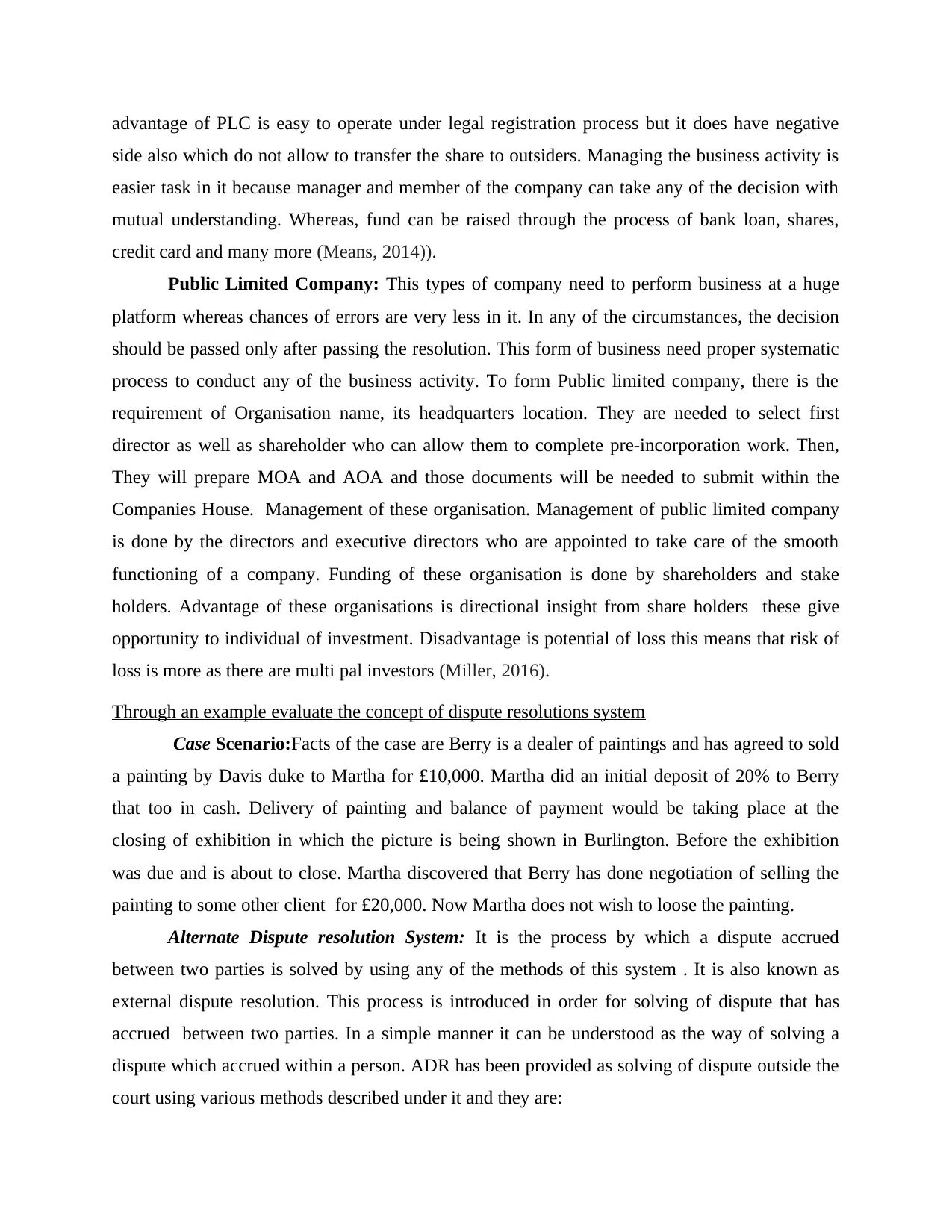
advantage of PLC is easy to operate under legal registration process but it does have negative
side also which do not allow to transfer the share to outsiders. Managing the business activity is
easier task in it because manager and member of the company can take any of the decision with
mutual understanding. Whereas, fund can be raised through the process of bank loan, shares,
credit card and many more (Means, 2014)).
Public Limited Company: This types of company need to perform business at a huge
platform whereas chances of errors are very less in it. In any of the circumstances, the decision
should be passed only after passing the resolution. This form of business need proper systematic
process to conduct any of the business activity. To form Public limited company, there is the
requirement of Organisation name, its headquarters location. They are needed to select first
director as well as shareholder who can allow them to complete pre-incorporation work. Then,
They will prepare MOA and AOA and those documents will be needed to submit within the
Companies House. Management of these organisation. Management of public limited company
is done by the directors and executive directors who are appointed to take care of the smooth
functioning of a company. Funding of these organisation is done by shareholders and stake
holders. Advantage of these organisations is directional insight from share holders these give
opportunity to individual of investment. Disadvantage is potential of loss this means that risk of
loss is more as there are multi pal investors (Miller, 2016).
Through an example evaluate the concept of dispute resolutions system
Case Scenario:Facts of the case are Berry is a dealer of paintings and has agreed to sold
a painting by Davis duke to Martha for £10,000. Martha did an initial deposit of 20% to Berry
that too in cash. Delivery of painting and balance of payment would be taking place at the
closing of exhibition in which the picture is being shown in Burlington. Before the exhibition
was due and is about to close. Martha discovered that Berry has done negotiation of selling the
painting to some other client for £20,000. Now Martha does not wish to loose the painting.
Alternate Dispute resolution System: It is the process by which a dispute accrued
between two parties is solved by using any of the methods of this system . It is also known as
external dispute resolution. This process is introduced in order for solving of dispute that has
accrued between two parties. In a simple manner it can be understood as the way of solving a
dispute which accrued within a person. ADR has been provided as solving of dispute outside the
court using various methods described under it and they are:
side also which do not allow to transfer the share to outsiders. Managing the business activity is
easier task in it because manager and member of the company can take any of the decision with
mutual understanding. Whereas, fund can be raised through the process of bank loan, shares,
credit card and many more (Means, 2014)).
Public Limited Company: This types of company need to perform business at a huge
platform whereas chances of errors are very less in it. In any of the circumstances, the decision
should be passed only after passing the resolution. This form of business need proper systematic
process to conduct any of the business activity. To form Public limited company, there is the
requirement of Organisation name, its headquarters location. They are needed to select first
director as well as shareholder who can allow them to complete pre-incorporation work. Then,
They will prepare MOA and AOA and those documents will be needed to submit within the
Companies House. Management of these organisation. Management of public limited company
is done by the directors and executive directors who are appointed to take care of the smooth
functioning of a company. Funding of these organisation is done by shareholders and stake
holders. Advantage of these organisations is directional insight from share holders these give
opportunity to individual of investment. Disadvantage is potential of loss this means that risk of
loss is more as there are multi pal investors (Miller, 2016).
Through an example evaluate the concept of dispute resolutions system
Case Scenario:Facts of the case are Berry is a dealer of paintings and has agreed to sold
a painting by Davis duke to Martha for £10,000. Martha did an initial deposit of 20% to Berry
that too in cash. Delivery of painting and balance of payment would be taking place at the
closing of exhibition in which the picture is being shown in Burlington. Before the exhibition
was due and is about to close. Martha discovered that Berry has done negotiation of selling the
painting to some other client for £20,000. Now Martha does not wish to loose the painting.
Alternate Dispute resolution System: It is the process by which a dispute accrued
between two parties is solved by using any of the methods of this system . It is also known as
external dispute resolution. This process is introduced in order for solving of dispute that has
accrued between two parties. In a simple manner it can be understood as the way of solving a
dispute which accrued within a person. ADR has been provided as solving of dispute outside the
court using various methods described under it and they are:
⊘ This is a preview!⊘
Do you want full access?
Subscribe today to unlock all pages.

Trusted by 1+ million students worldwide
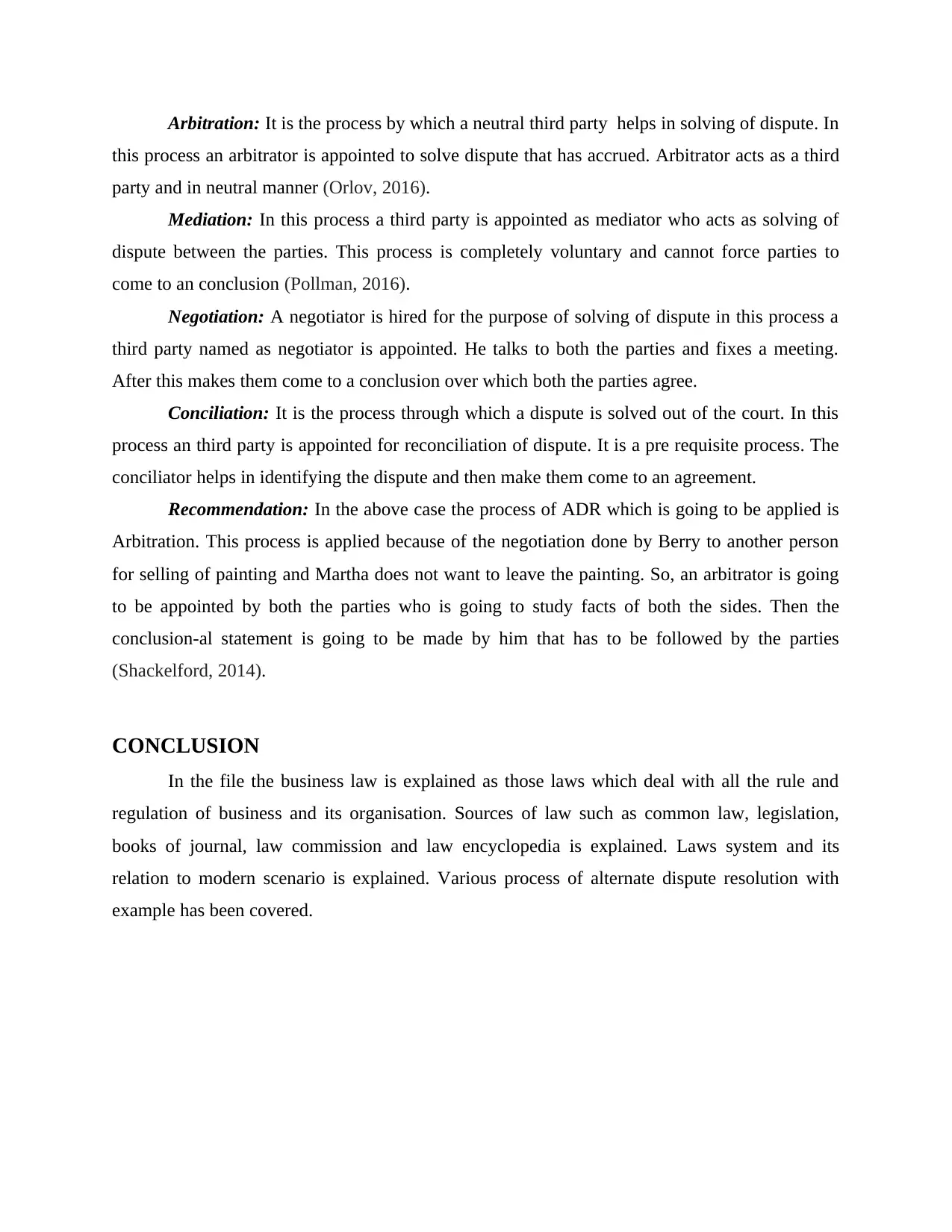
Arbitration: It is the process by which a neutral third party helps in solving of dispute. In
this process an arbitrator is appointed to solve dispute that has accrued. Arbitrator acts as a third
party and in neutral manner (Orlov, 2016).
Mediation: In this process a third party is appointed as mediator who acts as solving of
dispute between the parties. This process is completely voluntary and cannot force parties to
come to an conclusion (Pollman, 2016).
Negotiation: A negotiator is hired for the purpose of solving of dispute in this process a
third party named as negotiator is appointed. He talks to both the parties and fixes a meeting.
After this makes them come to a conclusion over which both the parties agree.
Conciliation: It is the process through which a dispute is solved out of the court. In this
process an third party is appointed for reconciliation of dispute. It is a pre requisite process. The
conciliator helps in identifying the dispute and then make them come to an agreement.
Recommendation: In the above case the process of ADR which is going to be applied is
Arbitration. This process is applied because of the negotiation done by Berry to another person
for selling of painting and Martha does not want to leave the painting. So, an arbitrator is going
to be appointed by both the parties who is going to study facts of both the sides. Then the
conclusion-al statement is going to be made by him that has to be followed by the parties
(Shackelford, 2014).
CONCLUSION
In the file the business law is explained as those laws which deal with all the rule and
regulation of business and its organisation. Sources of law such as common law, legislation,
books of journal, law commission and law encyclopedia is explained. Laws system and its
relation to modern scenario is explained. Various process of alternate dispute resolution with
example has been covered.
this process an arbitrator is appointed to solve dispute that has accrued. Arbitrator acts as a third
party and in neutral manner (Orlov, 2016).
Mediation: In this process a third party is appointed as mediator who acts as solving of
dispute between the parties. This process is completely voluntary and cannot force parties to
come to an conclusion (Pollman, 2016).
Negotiation: A negotiator is hired for the purpose of solving of dispute in this process a
third party named as negotiator is appointed. He talks to both the parties and fixes a meeting.
After this makes them come to a conclusion over which both the parties agree.
Conciliation: It is the process through which a dispute is solved out of the court. In this
process an third party is appointed for reconciliation of dispute. It is a pre requisite process. The
conciliator helps in identifying the dispute and then make them come to an agreement.
Recommendation: In the above case the process of ADR which is going to be applied is
Arbitration. This process is applied because of the negotiation done by Berry to another person
for selling of painting and Martha does not want to leave the painting. So, an arbitrator is going
to be appointed by both the parties who is going to study facts of both the sides. Then the
conclusion-al statement is going to be made by him that has to be followed by the parties
(Shackelford, 2014).
CONCLUSION
In the file the business law is explained as those laws which deal with all the rule and
regulation of business and its organisation. Sources of law such as common law, legislation,
books of journal, law commission and law encyclopedia is explained. Laws system and its
relation to modern scenario is explained. Various process of alternate dispute resolution with
example has been covered.
Paraphrase This Document
Need a fresh take? Get an instant paraphrase of this document with our AI Paraphraser
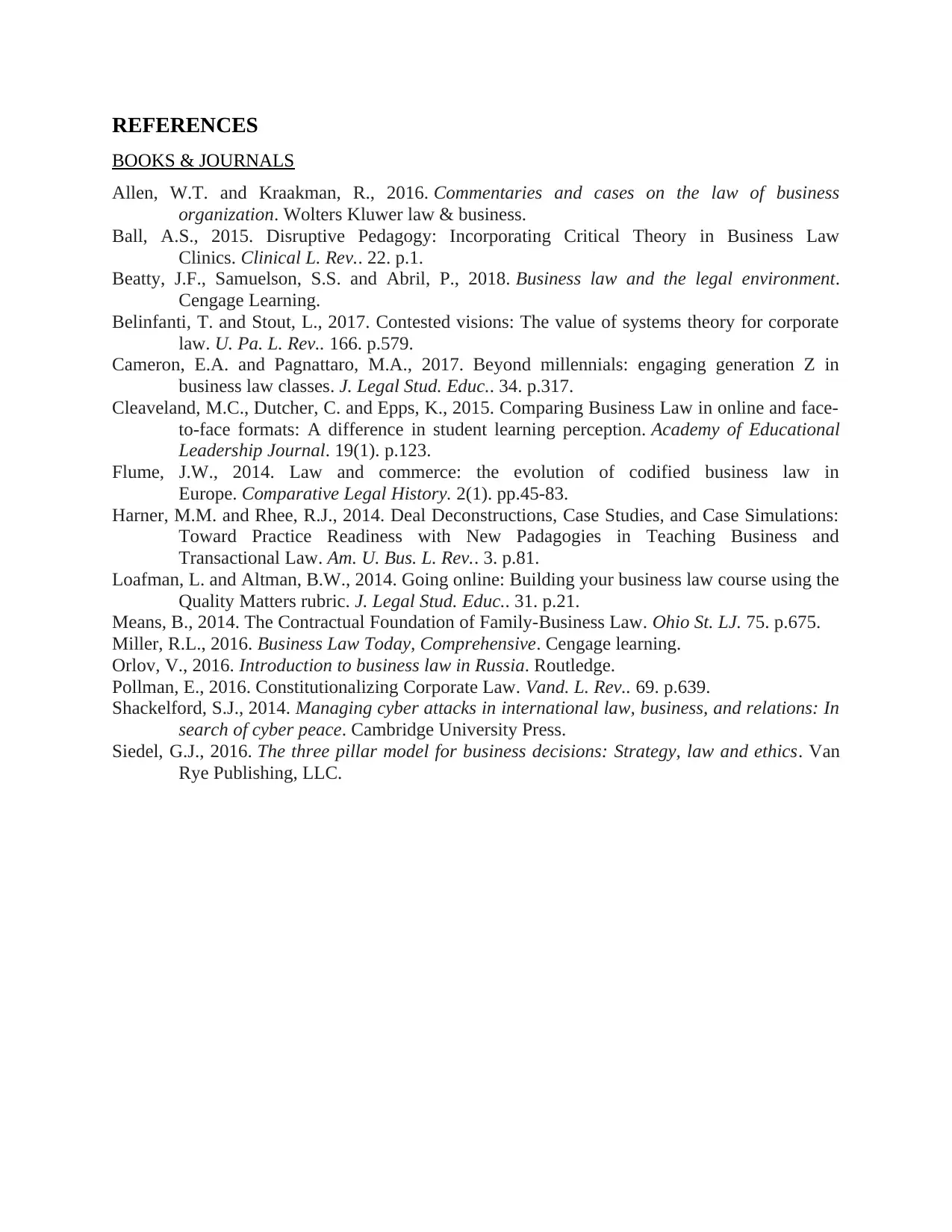
REFERENCES
BOOKS & JOURNALS
Allen, W.T. and Kraakman, R., 2016. Commentaries and cases on the law of business
organization. Wolters Kluwer law & business.
Ball, A.S., 2015. Disruptive Pedagogy: Incorporating Critical Theory in Business Law
Clinics. Clinical L. Rev.. 22. p.1.
Beatty, J.F., Samuelson, S.S. and Abril, P., 2018. Business law and the legal environment.
Cengage Learning.
Belinfanti, T. and Stout, L., 2017. Contested visions: The value of systems theory for corporate
law. U. Pa. L. Rev.. 166. p.579.
Cameron, E.A. and Pagnattaro, M.A., 2017. Beyond millennials: engaging generation Z in
business law classes. J. Legal Stud. Educ.. 34. p.317.
Cleaveland, M.C., Dutcher, C. and Epps, K., 2015. Comparing Business Law in online and face-
to-face formats: A difference in student learning perception. Academy of Educational
Leadership Journal. 19(1). p.123.
Flume, J.W., 2014. Law and commerce: the evolution of codified business law in
Europe. Comparative Legal History. 2(1). pp.45-83.
Harner, M.M. and Rhee, R.J., 2014. Deal Deconstructions, Case Studies, and Case Simulations:
Toward Practice Readiness with New Padagogies in Teaching Business and
Transactional Law. Am. U. Bus. L. Rev.. 3. p.81.
Loafman, L. and Altman, B.W., 2014. Going online: Building your business law course using the
Quality Matters rubric. J. Legal Stud. Educ.. 31. p.21.
Means, B., 2014. The Contractual Foundation of Family-Business Law. Ohio St. LJ. 75. p.675.
Miller, R.L., 2016. Business Law Today, Comprehensive. Cengage learning.
Orlov, V., 2016. Introduction to business law in Russia. Routledge.
Pollman, E., 2016. Constitutionalizing Corporate Law. Vand. L. Rev.. 69. p.639.
Shackelford, S.J., 2014. Managing cyber attacks in international law, business, and relations: In
search of cyber peace. Cambridge University Press.
Siedel, G.J., 2016. The three pillar model for business decisions: Strategy, law and ethics. Van
Rye Publishing, LLC.
BOOKS & JOURNALS
Allen, W.T. and Kraakman, R., 2016. Commentaries and cases on the law of business
organization. Wolters Kluwer law & business.
Ball, A.S., 2015. Disruptive Pedagogy: Incorporating Critical Theory in Business Law
Clinics. Clinical L. Rev.. 22. p.1.
Beatty, J.F., Samuelson, S.S. and Abril, P., 2018. Business law and the legal environment.
Cengage Learning.
Belinfanti, T. and Stout, L., 2017. Contested visions: The value of systems theory for corporate
law. U. Pa. L. Rev.. 166. p.579.
Cameron, E.A. and Pagnattaro, M.A., 2017. Beyond millennials: engaging generation Z in
business law classes. J. Legal Stud. Educ.. 34. p.317.
Cleaveland, M.C., Dutcher, C. and Epps, K., 2015. Comparing Business Law in online and face-
to-face formats: A difference in student learning perception. Academy of Educational
Leadership Journal. 19(1). p.123.
Flume, J.W., 2014. Law and commerce: the evolution of codified business law in
Europe. Comparative Legal History. 2(1). pp.45-83.
Harner, M.M. and Rhee, R.J., 2014. Deal Deconstructions, Case Studies, and Case Simulations:
Toward Practice Readiness with New Padagogies in Teaching Business and
Transactional Law. Am. U. Bus. L. Rev.. 3. p.81.
Loafman, L. and Altman, B.W., 2014. Going online: Building your business law course using the
Quality Matters rubric. J. Legal Stud. Educ.. 31. p.21.
Means, B., 2014. The Contractual Foundation of Family-Business Law. Ohio St. LJ. 75. p.675.
Miller, R.L., 2016. Business Law Today, Comprehensive. Cengage learning.
Orlov, V., 2016. Introduction to business law in Russia. Routledge.
Pollman, E., 2016. Constitutionalizing Corporate Law. Vand. L. Rev.. 69. p.639.
Shackelford, S.J., 2014. Managing cyber attacks in international law, business, and relations: In
search of cyber peace. Cambridge University Press.
Siedel, G.J., 2016. The three pillar model for business decisions: Strategy, law and ethics. Van
Rye Publishing, LLC.
1 out of 11
Related Documents
Your All-in-One AI-Powered Toolkit for Academic Success.
+13062052269
info@desklib.com
Available 24*7 on WhatsApp / Email
![[object Object]](/_next/static/media/star-bottom.7253800d.svg)
Unlock your academic potential
Copyright © 2020–2025 A2Z Services. All Rights Reserved. Developed and managed by ZUCOL.





